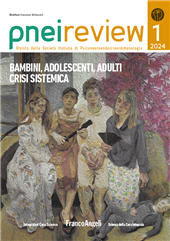2024 - Franco Angeli
Artikel
Digital Version
Herunterladen | Kopieren/Einfügen | Drucken
Il padre ritrovato : aspetti antropologici e psiconeuroendocrini della nuova paternità
P. 37-50
- Nel corso del secolo scorso si è assistito a una profonda trasformazione del ruolo del padre. Dopo migliaia di anni in cui le famiglie si sono organizzate attorno a un modello patriarcale, nel giro di pochi decenni i sistemi familiari si sono trasformati in quella che può essere definita la famiglia nucleare contemporanea. Le ricerche hanno evidenziato quanto oggi il padre sia impor- tante fin dall'inizio del concepimento e per tutta la prima infanzia della pro- le. Questo ha influito non solo sul rapporto di coppia e con i figli, ma anche sulla struttura biologica dell'uomo, con cambiamenti sul piano epigenetico e neuroendocrino influenzando inevitabilmente anche la salute psicologica del padre. Oggi sappiamo che i disturbi affettivi perinatali paterni sono fre- quenti quasi quanto quelli femminili, ma la loro diagnosi risulta difficile in quanto i padri tendono a manifestare le proprie difficoltà emotive in modo differente dalle donne.
- Un passo avanti significativo nello studio di padri (e madri) è rappresentato dalla loro valutazione in una prospettiva sistemica ecologica. [Testo Dell'Editore].
- Over the last century there has been a profound transformation in the role of the father. After thousands of years in which families were organized around a patriarchal model, within a few decades family systems have transformed into what can be deï¬Âned as the contemporary nuclear family. Research has highlighted how important the father is today from the beginning of conception and throughout the early childhood of his offspring. This has inï¬Âuenced not only the relationship between the couple and with their children, but also on the biological structure of man, with changes on the epigenetic and neuroendo- crine level inevitably also inï¬Âuencing the psychological health of the father. Today we know that paternal perinatal affective disorders are almost as frequent as female ones, but their diagnosis is difï¬Âcult as fathers tend to express their emotional difï¬Âculties differently from women.
- A signiï¬Âcant step forward in the study of fathers (and mothers) is represented by their evaluation in a systemic ecological perspective. [Publisher's Text].
Ist Teil von
PNEI review : rivista della Società Italiana di Psiconeuroendocrinoimmunologia : 1, 2024-
Informationen
ISSN: 2532-2826
KEYWORDS
- Padre, Famiglia, Disturbi affettivi perinatali, Ansia, Depressione, Psiconeuroendocrinologia
- Father, Family, Perinatal affective disorders, Anxiety, Depression, Psychoneuroendocrinology
-
In derselben Datei
- Giovani e adulti : crisi sistemica
- Stili di attaccamento genitoriale e salute mentale dei figli
- La Pnei nelle nuove sfide genitoriali : i figli oppositivi, Hikikomori, cyber-dipendenti e cutters
- Il padre ritrovato : aspetti antropologici e psiconeuroendocrini della nuova paternità
- L'integrazione corpo-mente nella pratica clinica oggi : psicoanalisi e Pnei a dialogo
- Neurofisiologia, interazioni neuro-immunitarie e meccanobiologia nell'osteopatia craniale : una prospettiva basata sull'evidenza per un razionale scientifico
- Immunità comune
- Filosofia dell'immunologia e della Psiconeuroendocrinoimmunologia
- Il mondo del microbiota


